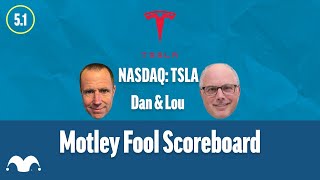In a filing with the Securities and Exchange Commission this week, Tesla Motors (TSLA +0.04%) officially dropped "Motors" from its name, now taking on the corporate name of simply Tesla, Inc. The change comes as the company ramps up its energy storage business and it follows Tesla's recent acquisition of solar company SolarCity.

Image source: The Motley Fool.
A fitting move
Tesla CEO Elon Musk has previously noted he wanted to change the company's corporate name to just Tesla, citing the company's growing energy offerings. To this end, Tesla changed its website from teslamotors.com to tesla.com last year, after the company purchased the domain from its owner.
Recently, Tesla has made its energy ambitions clearer than ever. In October, Tesla unveiled its solar roof. And, in November, Tesla officially acquired SolarCity. Meanwhile, Tesla's energy storage business is ramping up quickly. Just this week Tesla celebrated its recent 80 megawatt-hour battery storage installation for a California electric utility. This single installation is more than three times Tesla's record first-quarter 25 megawatt-hours of energy storage deliveries, which management said spanned four continents and included 2,500 of its residential Powerwall energy storage products and nearly 100 of its commercial Powerpacks.

Tesla CEO Elon Musk shows a Tesla solar roof cell. Image source: Tesla Motors.
Furthermore, Tesla Chief Technology Officer JB Straubel told Bloomberg this week that its energy storage business "is growing as fast as we can humanly scale it."
Fortifying its energy business, Tesla announced a second-generation Powerwall and Powerpack in October with higher energy density and slightly lower costs on a per-kilowatt-hour basis.
Looking forward, Tesla only expects its energy storage business to grow more significant. Musk said in a Q&A with press after a Gigafactory tour in August that he expects "exponential growth from here."
By removing "Motors" from its name, Tesla is emphasizing how integral it expects energy storage and solar to be in the company's mission to accelerate the advent of sustainable energy.
But Tesla is still primarily an electric-car maker
Of course, it's going to take more than a name change for Tesla to truly shift its business increasingly toward energy products. Investors should bear in mind that Tesla still generates the bulk of its revenue from electric vehicles. Indeed, even after Tesla's recent acquisition of SolarCity, nearly 90% of Tesla's revenue comes from electric vehicles -- and this likely won't be changing anytime soon considering the company is planning to significantly ramp up vehicle deliveries when it brings its Model 3 to market later this year.

Image source: The Motley Fool.
With the help of its lower-cost, higher-volume Model 3, Tesla is planning to increase vehicle production from an annualized run-rate of 100,000 units today to 500,00 units in 2018. Therefore, even exponential growth in Tesla's energy storage and solar businesses over the next two years is unlikely to reduce the importance of electric vehicles to Tesla's overall results.






